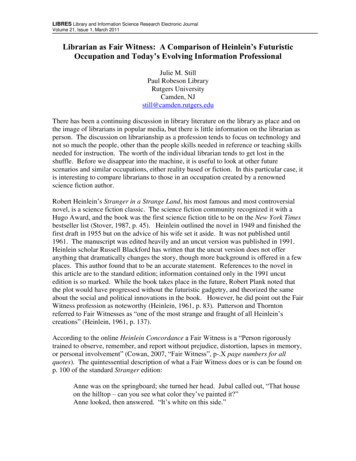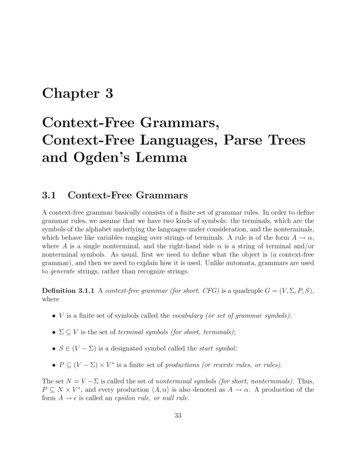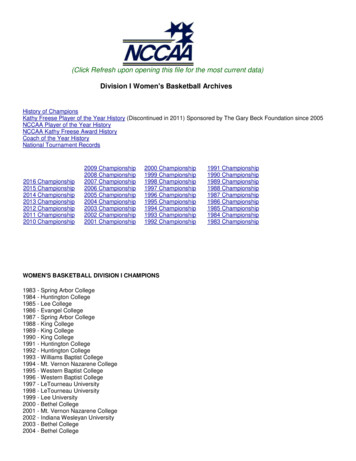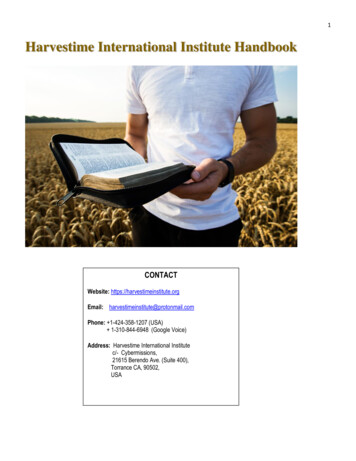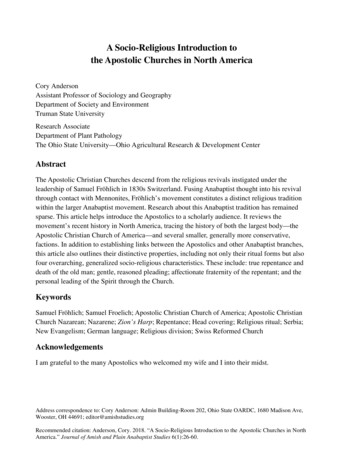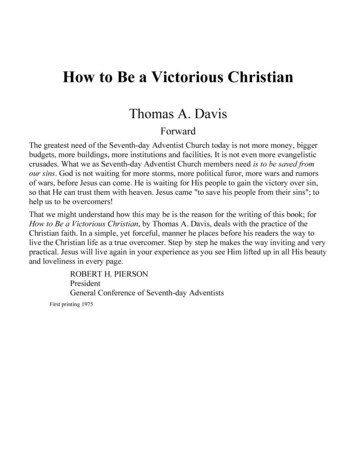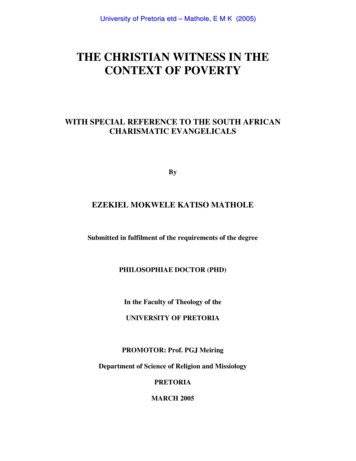
Transcription
University of Pretoria etd – Mathole, E M K (2005)THE CHRISTIAN WITNESS IN THECONTEXT OF POVERTYWITH SPECIAL REFERENCE TO THE SOUTH AFRICANCHARISMATIC EVANGELICALSByEZEKIEL MOKWELE KATISO MATHOLESubmitted in fulfilment of the requirements of the degreePHILOSOPHIAE DOCTOR (PHD)In the Faculty of Theology of theUNIVERSITY OF PRETORIAPROMOTOR: Prof. PGJ MeiringDepartment of Science of Religion and MissiologyPRETORIAMARCH 2005
University of Pretoria etd – Mathole, E M K (2005)TABLE OF KEY TERMSixACRONYMS AND groundThe Problem StatementGoal of StudyResearch MethodsDefinition of 3.42.3.52.3.62.42.52.62.7THE MANY/HUMAN FACES OF POVERTY IN SAThe Prevalence of PovertyThe Causes of Poverty in South AfricaPoverty and InequalityPoverty and RacePoverty and GenderPoverty and ChildrenPoverty and ClassPoverty and EducationPoverty and UnemploymentCity/ Urban and Rural PovertyRegions and PovertyPoverty as a Systemic ProblemThe Experience of the PoorBasic NeedsVulnerabilityCrime and ViolenceSubstance AbuseSocial ExclusionUnemploymentThe Dehumanising Power of PovertyPoverty, Illness and DeathHope for the 464749565962i
University of Pretoria etd – Mathole, E M K .2.43.33.3.13.3.23.3.33.3.43.3.53.43.4.13.4.23.5A BIBLICAL AND THEOLOGICAL REFLECTION ON POVERTY 65God and the Poor65The Phenomenon of Poverty65The Phenomenon of Wealth68God’s Concern for the Poor70Jesus Identifying with the Poor74The Message of Salvation76The Concept of Salvation in the O.T.76The Prophetic Nature of Witnessing79The Message of the Gospel80A Call to Conversion82The Kingdom of God85The Nature of the Kingdom of God86The Proclamation of the Kingdom90The Kingdom of God is the Revelation of Justice, Peace and Joy97The Kingdom of God is the Goal of Evangelism99The Church and the Kingdom of God101The Church and Poor105The First Century Church and the Poor105The Church serving the Poor109Conclusion1104.A THEOLOGICAL REFLECTION ON KEY ASPECTS OF POVERTYERADICATION IN THE TWENTIETH CENTURY112From Relief, Development, Transformation and Sustainability112The Aspect of Relief113The Definition of Relief113Critique of Relief117Development120Definition of Development120Origin of the Development Theory121The Changing Concept of Development123Whose Development?126The Vision of Development127The Challenges for Development128A Critical Response to Development128The Transformational Approach133Definition of Transformation135Why Transformation141Elements of Transformation144The Critique of Transformation155The Concept / Factor of Sustainability156Definition of Sustainable Development156The Key Aspects on Sustainability157A Critique of Sustainability165The Goal of Development as .5.24.5.34.6ii
University of Pretoria etd – Mathole, E M K (2005)4.7Conclusion1755.THE CHARISMATIC EVANGELICALS IN SA1775.1The Rise of Charismatic Evangelicals in SA and itsGlobal Connections5.1.1 The Ecumenical Roots of the Charismatic Renewal Movement5.1.2 The Emergence of Charismatic Evangelicals and their PentecostalHeritage5.1.3 Pentecostal or Charismatic5.2The Phenomenon of Charismatic Evangelicalism in SA5.3The Struggles for Unity Post 19945.4Charismatic Evangelical Teachings and Theology5.4.1 Jesus Christ5.4.2 Baptism of the Holy Spirit5.4.3 Scriptures5.4.4 Conversion5.4.5 Healing5.4.6 Faith Alone5.4.7 The Church5.4.8 Prosperity Theology5.4.9 Eschatology5.4.10 Technology and Media5.5. The Missiological thinking of the Charismatic Evangelicals5.5.1 Missions as Evangelism5.5.2 Missions as Evangelism and Social Action5.5.2.1 Berlin Congress 19665.5.2.2 Lausanne Covenant 19745.5.2.3 Pattaya Conference 19805.5.2.4 Wheaton 19835.5.2.5 San Antonio 19895.5.2.6 The Evangelical Response to San Antonio, Lausanne II Manilla, 19895.5.2.7 Manilla, 19895.5.2.8 The Concerned Evangelicals in SA5.5.2.9 Salvador, Brazil 19965.5.2.10 GCOWE, Pretoria 19975.5.2.11 Inguassu, Brazil 19995.5.2.12 Kuala Lampur, Malaysia 20015.5.2.13 Pattaya 20045.5A Critique of Charismatic 2252272312342362372382466. THE CHARISMATIC EVANGELICAL RESPONSE TO POVERTYIN SA6.1The Positions of Key National Leaders6.1.1 Dr Isak Burger – AFM248249249iii178178
University of Pretoria etd – Mathole, E M K (2005)6.1.1.1 The Experience of Poverty6.1.1.2 Theology/Teaching in Relation to Poverty6.1.1.3 Response to Poverty6.1.1.4 The Relationship Between Poverty and the Work of Church6.1.2 Rev Moss Ntlha –TEASA6.1.2.1 The Experience of Poverty6.1.2.2 Theology/Teachings in Relation to Poverty6.1.2.3 Response to Poverty6.1.2.4 The Relationship Between Poverty and the Work of the Church.6.1.3 Rev Chris Venter – IFCC6.1.3.1 The Experience of Poverty6.1.3.2 Theology/Teaching in Relation to Poverty6.1.3.3 Response to Poverty6.1.3.4 The Relationship Between Poverty and the Work of the Church6.1.4 Pastor Ray McCauley – Rhema Ministries SA6.1.4.1 The Experience f Poverty6.1.4.2 Theology/Teachings in Relation to Poverty6.1.4.3 Response to Poverty6.1.4.4 The Relationship Between Poverty and the Work of the Church6.1.4.5 General6.1.5 Pastor Mosa Sono – Grace Bible Church6.1.5.1 The Experience of Poverty6.1.5.2 Theology/Teachings in Relation to Poverty6.1.5.3 Response to Poverty6.1.5.4 The Relationship Between Poverty and the Work of the Church6.2A Comparative Analysis of Positions of National Leaders6.3Positions of Some Leaders Charismatic Evangelicals Local Churches6.3.1 Bishop Gladstone Botwana – Zoe Bible Church6.3.1.1 The Experience of Poverty6.3.1.2 Theology/Teaching in Relation to Poverty6.3.1.3 Response to Poverty6.3.1.4 The Relationship Between Poverty and the Work of the Church6.3.1.5 General6.3.2 Pastor Don Phillips6.3.2.1 The Experience of Poverty6.3.2.2 Theology and Teachings in Relation to Poverty6.3.2.3 Response to Poverty6.3.2.4 The Relationship Between Poverty and the Work of the Church6.3.2.5 General6.4A Comparative Analysis of Local Church Leaders6.5A Critique of Charismatic Church Leaders Response to NCLUSION7.1Reconceptualizing of Christian Witness amongst the Poor7.1.1 The Empowering Ministry Amongst the Poor324325325iv
University of Pretoria etd – Mathole, E M K (2005)7.1.2 Consolidation of Charismatic Evangelicals Positions7.1.2.1 Foundational Reflections7.1.2.2 Transformational Ministry Vision7.1.2.3 The Prophetic Role of the Charismatic Church7.1.2.4 The Conversion to be a more of a Church of the Poor7.1.2.5 The Quality and Sustainability of Ministries7.1.2.6 The Local Churches Holistic Ministry7.1.2.7 The Importance of Leadership7.1.2.8 The Significance of Education in Poverty Eradication7.1.2.9 A Warning against the tendency to Projectize Ministry to Poor7.2Poverty a Continuous Challenge7.3Further Areas of Research3283283283303323343353363383393403418. BIBLIOGRAPHY3429. APPENDIX3669.19.1366Interview ScheduleAnnexure to Chapter 6: Report on Interviews with Leading CharismaticLeaders of Local Churches and Interview Schedulev369
University of Pretoria etd – Mathole, E M K (2005)ACKNOWLEDGEMENTS I would like to thank my study supervisor Prof. Piet Meiring, for his guidanceand support during my studies. You have been a good mentor and promoter. To all the leaders and Pastors nationwide within the Pentecostal – CharismaticEvangelicals who participated in my interviews during my research. Thanks toPastor Mosa Sono, Dr Isak Burger, Pastor Ray McCauley, Rev Eben Miller,Rev Moss Ntlha, Pastor Colin La Foy, Bishop Gladstone Botwana, BishopStephen Zondo, Pastor Thembinkosi Ntongana, Pastor Thomas Makhubu,Pastor Buti David Molutsi and Pastor Glen Shroedder. Thanks to Prof. Oupa Mashile, UNISA for your inspiration I have often usedyou as a sounding board for my ideas. You have been a good friend. Thanks to Sannie Meiring, Busi Nkosi, Dr Agrippa Khathide for helping toproof read this report. Thank you to all my friends especially the Lengana’s and Matee’s for yoursupport and encouragement. To my family, Tonono, Nthati, Thato, Sharon, Kefilwe, Kesentseng, Tebogo,Dolly, Duku, Kutlwano and Boy, I can never thank you enough for your love,prayers, goodwill and invaluable support. Thanks to my colleagues at GBC Soweto offices and especially Sam Masigoand Olga Mbele for your invaluable support.To God Be The GloryPretoriaMarch 2005.vi
University of Pretoria etd – Mathole, E M K (2005)DEDICATIONDedicated to my late mother, Sophie Musi – you have been and continue to be aninspiration to me. For your sacrifice, faith, dedication and compassion for the poor.You overcame adversity as a single parent to raise us. We, thank God for you.vii
University of Pretoria etd – Mathole, E M K (2005)SUMMARYThe topic of my study is: The Christian witness in the context of poverty, with specialreference to South African Charismatic Evangelicals. The big challenge that I amaddressing is the endemic poverty that is facing our entire nation. The issue of theChristian’s response to poverty needs to be addressed adequately. In this case,particularly, the focus is on the response of the Charismatic Evangelical Church to theplight of the poor. Poverty is more than just a theoretical theological question.Poverty is about existential problems faced by real people in their struggle forfreedom from powerlessness and marginalization. Therefore, I seek to reflect on themany human faces of poverty in South Africa, highlighting the causes of poverty andthe unique experiences of the poor.I am also exploring the theological foundations of the Church and its witness amongstthe poor. Reading through the Scriptures one discovers the foundational principlesthat are imperative in defining the Church’s mission, ministry and message. This isfollowed by a theological reflection on key aspects of poverty eradication in the 20thCentury. This includes a reflection on relief, development, transformation andsustainability. These concepts have all influenced various responses of Christians indealing with the issue of poverty in their witness.Poverty should not continue unabated in the Christian community, the very peoplewho received the commission to minister to the poor in their suffering from the LordJesus Himself. Throughout the centuries, the Church was challenged to minister to thepoor in distress. The challenge has not disappeared. In our time, in our country, alsoin the circles of Charismatic Evangelical Christians, we are called to respond to thecry of the poor. Thus, in this study I present a brief background to the CharismaticEvangelicals in South Africa, looking at their fundamental teachings and theology,and the development of their missiological thinking when facing the realities ofpoverty. This is followed by their practical responses to poverty, based on a report oninterviews that have been conducted with various leaders within the Charismaticviii
University of Pretoria etd – Mathole, E M K (2005)Evangelical Church, which often has been accused of being apolitical and sociallyirrelevant.Finally, I reflect on the conclusions that I have drawn on how the CharismaticEvangelical Churches have reconceptualized their Christian Witness amongst thepoor. I examine the manner in which they have pursued an empowering ministry inpoor communities, and how they have consolidated their theological and practicalpositions in their ministry to eradicate poverty.KEY TERMS Christian Witness Mission Evangelism Pentecostal Charismatic Evangelical Kingdom of God Poverty Development Transformation Sustainabilityix
University of Pretoria etd – Mathole, E M K (2005)ACRONYMS AND ABBREVIATIONSACDPAfrican Christian Democratic PartyAFMApostolic Faith MissionANCAfrican National CongressCEConcerned EvangelicalsCWMEConference on World Mission and EvangelismCPFCommunity Policing ForumEFSAEvangelical Fellowship of South AfricaFGBMFIFull Gospel Business Men’s Fellowship InternationalGCOWEGlobal Consultation on World EvangelisationGDPGross Domestic ProductGEARGrowth, Employment, and Redistribution Macroeconomic StrategyIDASAThe Institute for Democracy in South AfricaIFCCInternational Fellowship Christian ChurchesLCWELausanne Congress of World EvangelisationNEPADNew Partnership for Africa’s DevelopmentNGONon-profit OrganizationPSLSDProject for Statistics on Living Standards and DevelopmentRDPReconstruction and Development ProgrammeRSFRhema Service FoundationSAPSSouth African Police ServicesTEASAThe Evangelical Alliance of South AfricaTRCTruth and Reconciliation Commissionx
University of Pretoria etd – Mathole, E M K (2005)UNDPUnited Nations Development ProgrammeWCCWorld Council of ChurchesWEAWorld Evangelical AllianceWEFWorld Evangelical Fellowshipxi
University of Pretoria etd – Mathole, E M K (2005)CHAPTER 1INTRODUCTION1.1BackgroundInterest in this research has been triggered by my own background that has beeninfluenced and shaped by the realities of our country, and by my personal family andministry experience.Contextual RealitiesSouth Africa is a nation of contrasts that has elements that characterize both the Northand the South in terms of the quality of life of its citizens. It is a nation of extremes interms of the existing disparities in how wealth is distributed. There is a minority withinthe population that lives in relative comfort and privilege. On the other hand the majorityof the population live in dire poverty. This kind of impoverishment seems to beincreasing, while the gap between the rich and the poor is widening in disturbingproportions.Personal Family ExperienceI have the experience of being raised in hardship by a single parent taking care of afamily of six children, not forgetting to mention regular guests from our extended family.It is out of this upbringing in poverty, living in a four-roomed [one bedroom] municipalhouse in the township, that I was nurtured into adulthood in the most difficultcircumstances. I learned to make do with bare necessities in terms of clothing and food inan overcrowded dwelling. We had to survive on the meagre income of a single parent1
University of Pretoria etd – Mathole, E M K (2005)who had seasonal jobs as a domestic worker, cleaner at a supermarket, fruit and vegetablehawker and a traditional healer. To these problems were added those difficulties thatalmost every Black South African had to endure in the previous dispensation ofsegregation and oppression.Personal Ministry Experience.I started working full-time for a church on the 1st December 1996. The office of thechurch was a garage built for a car, which was shared by four staff members. This garagealso served as a storeroom for household goods that could not be accommodated in thehouse. This was my small beginning in the ministry in an ill-equipped ‘garage office’ inthe township of Soweto. Ministry was rough in the heyday of apartheid whilst I workedfor a small independent Charismatic Evangelical church known as Grace Bible Church.At first, we congregated at a school hall, and then moved to a rented church sanctuarythat we also shared with another church that met on Saturdays. Subsequently, we movedto the classrooms of Hlengiwe Secondary School that had been burnt down during thestudent upheavals in White City Jabavu. These classrooms had roofs without walls, sincethe sides were destroyed. Then, we moved to a larger exhibition stall, which also waswithout walls, and it became our church sanctuary for seventeen years. We just became apilgrim church moving from one bad situation to an even worse one. Conducting ministryat the height of apartheid was hard in Soweto, since we were not only confronted with theissues of poverty, but also of injustice, police brutality, educational disruptions, and along list of other societal problems. Theological tensions emerged along the way, sincewe were in a broader Evangelical movement that shunned socio-political issues andtaught a gospel that was heavenly but irrelevant to people facing social tensions. Many ofus began to question and reject such apolitical spirituality since we had been politicisedby defiant students movements like the 1976 uprising from the time when I was a learnerin Tlhatlogang Higher Primary a school next door to Morris Isaacson High School [whichI attended in the late seventies for two years after it was reopened when the unrestssubsided. It was closed indefinitely when our group once again became involved inprotest action]. I was politically socialized by the Azanian Student Organization2
University of Pretoria etd – Mathole, E M K (2005)(AZASO) [as student at the Soweto College of Education], which was affiliated to theUnited Democratic Front. Also, I was affiliated to other youth movements like YouthAlive Ministry and other civic organizations. Then later on, one was seconded to work inOrange Farm, which is situated to the south of Johannesburg. I worked there, in aninformal settlement, for ten years facing conditions of squalor. Subsequently, I wasappointed as head of a department coordinating missions for five years. My jobresponsibilities caused me to spend long hours working in previously disadvantagedcommunities. When working within those communities I was confronted with serioussocial problems, like poverty.1.2The Problem Statement1.2.1Growing National PovertyOur nation is facing a crisis of rampant poverty. Throughout the country we have to dealwith problems like malnutrition, unemployment, and homelessness. A sizeable section ofour citizenry is living under inhumane conditions. The irony is that South Africa is ratedas one of the richest and best-developed nations in Africa. The big question is; “What isthe nature of the Christian witness within a nation that is a young democracy, that isfacing the challenges of deprivation?” Poverty is a point of concern, because it isaffecting almost half of the South African population. The question of destitution is adilemma that is a concern to all conscientious citizens in this country. It is not just atheoretical or fictitious difficulty. Poverty is about existential problems faced by realpeople in their struggle to free themselves from the powerlessness and marginalizationthat is destroying their lives. It is these ordinary people who are feeling the actual pain,inconvenience, shame and prejudice of poverty.1.2.2A Theological ChallengeThe Christian faith has a foundation of a kind of spirituality that is pro-poor. Accordingto Escobar and Driver (1978: 38 – 39),3
University of Pretoria etd – Mathole, E M K (2005)“Poverty and wealth are not accepted anymore as a kind of natural order, and withrising expectations has come an awareness that these differences are man-madedifferences that have developed in the process of history. The concept of a divinehand behind the economic process, giving much to those who worked hard anddeserve the fruit of their labour, is being questioned Poverty is no longer asimple datum you consider neutrally. Missions have to do something about it.After all, they could be part of the system that produces poverty or maintains it.”The issue of the Christian’s response to poverty needs to be addressed adequately.Poverty should not continue unabated in the presence of the Christian community, whichhas a calling to minister to the poor. “The Bible is packed with numerous injunctions andcommands calling the people of God to minister to the foreigner, alien, fatherless, widowand the poor. Such ministry on the part of the church is not optional – it is commanded byour Lord”(Christian 1999: IX). Throughout the centuries, the Church was challenged tominister to the distressed population. The challenge has not disappeared; it is still asummons to Christians of our generation. In our time, in our country, also in the circles ofCharismatic Evangelical Christians, we are called to respond to the cry of the poor.1.3Goal of StudyThe goal of the study I am individually undertaking, is to ultimately discover how theCharismatic Evangelical Church can become an authentic agent of the gospel,participating in poverty eradication within our society. This brand of Christianity shouldhave some form of compassion, driving it to serve the have-nots. According to Bosch(1980:53 –54),“Compassion is also the essence of the New Testament message, especially thatof Jesus It is striking to note the way in which the people on whom Jesus hadcompassion are described. They are referred to as the poor, the blind, the crippled,the leprous, the hungry, those who weep, the sick, the little ones, the widows, thecaptives, those who are lost, those who are weary and heavily burdened withlegalism, the lost sheep.”4
University of Pretoria etd – Mathole, E M K (2005)This is the constituency that the Charismatic Evangelical Christians should prioritise intheir witness.I intend to use a contextual approach to this study, since, when we preach, teach, andengage in social action we do all these activities in a particular situation. This is what iscalled our socio-economic and political context. Therefore, our ministry activities,programmes, theories, social analysis, prayers, proclamation and participation arepursued in that context. Thus, our mission must be concretised to be suitable to thecontext of our ministry.Charismatic Evangelicals have been known in the past for being apolitical and oftensocially irrelevant in their witness, despite the clear injunctions of the Scriptures that haveoutlined the mandate of the church as a mission that embraces social issues. Thisnegative perception is compounded by the fact that very little has been written about theirministry in response to poverty. In the past, the Church has often failed to become aneffective agent of social change in society. “Most evangelical groupings with theirnarrow view of life and their fundamentalistic approach to the Bible tend to uncriticallysupport existing oppressive systems”(Concerned Evangelicals 1986:15). In essence, it hasa legacy of having failed the poor. I wish to explore the fact that Christians can rise to thechallenge of having a credible witness and ministry that contributes significantly to eitherthe alleviation or the eradication of poverty amongst the destitute in our society,especially in the context of what Jesus said, "For the poor you have with youalways”(John 12:8). If this is the case, can we claim plausibly that our ministrymeaningfully contributes to either the alleviation or eradication of poverty? Poverty, itseems will continue to be a human challenge.In the course of this thesis, I therefore propose to give attention to the following: To investigate if the Charismatic Evangelicals’ witness within the context ofpoverty is compatible to the mission mandate that Jesus Christ gave to the church.It has not been the tendency of the Charismatic Evangelicals in South Africa to5
University of Pretoria etd – Mathole, E M K (2005)document their ministry activities, therefore not much is known about their actualwitness in response to the circumstances of impoverishment in this country. To discovering alternative responses to poverty alleviation/ eradication. Toexplore the possibility of finding an appropriate, relevant, and practicalCharismatic Evangelical Christian witness in the face of deprivation. To define the theological and biblical responses when there are apparentcontradictory contextual realities characterized by widespread impoverishment. To search for an authentic ministry that will empower the poor. To analysewhether their contribution should be focused on poverty alleviation or eradication.1.4Research Methods I intend to review all relevant publications on poverty, as well as on theChristian’s response to poverty, since my research would be descriptive. I have conducted a field study of various Charismatic Evangelical Churches andmovements involved in poverty eradication or alleviation programs in urban andrural communities. This research sampling of Charismatic Evangelicals is criticalbecause in my preliminary investigation I discovered that very little has beenpublished about their witness amongst the poor. I have interviewed key leaders within the Charismatic Evangelical Church. Theseleaders are at different levels of leadership; some are leading nationally whilstothers are leading locally within the Charismatic-Pentecostal Evangelicalmovement. The purpose has been to study various Charismatic Evangelicalchurches in their broad and diverse presence within the South African Christiancommunity. The interviews were conducted according to a preset interview schedule that hadquestions that were asked and the reason why they were asked. The interviewschedule had five sections to solicit relevant information from the intervieweesresponses on the following issues: the interviewees experience of poverty,theology or teaching in relation to poverty, response to poverty, the relationshipbetween poverty and the work of the church and other general issues. For acomplete interview schedule refer to the Appendix.6
University of Pretoria etd – Mathole, E M K (2005)1.5Definition of Terms1.5.1Concept of PovertyPoverty may be an overused word, but in our times it is still an explosive term. It is aword that evokes various emotions amongst its different users. It is a word that has beenencumbered by various ideologies, philosophies and beliefs, each with its own agenda.“Poverty is a complex phenomenon. It is a value-loaded concept involving evaluativejudgments regarding minimum, basic needs and desired levels of living”(Christian1999:17). Poverty is a phenomenon that has many stakeholders; therefore eachstakeholder would look at it from a different perspective.Poverty as LackPoverty depicts a scenario where people experience a shortage of essential resources andservices necessary for their survival as human beings. Many definitions have been used todescribe poverty. According to Myers (1999b: 578) view,“Poverty results from lack of things. It is obvious that poor people do not haveenough to eat, a place to sleep or clean water. We also recognize that some poorpeople lack knowledge and skills. Their land is poor, there is no water forirrigation, the roads are poor and there are no schools for their children.”The lack we are referring to is a shortage of the basics necessities of life to live a decenthuman life. “Poverty as defined here is the unfulfilment of the basic human needsrequired to adequately sustain life free from disease, misery, hunger, pain, suffering,hopelessness and fear, on the one hand, and the condition of defenceless people sufferingfrom structural injustice on the other.”(De Santa Ana.1979:76). Those who aredisadvantaged live a life of dependency in which they survive owing to the goodwill ofothers rather than self-support. Humbert says, “The poor person is, therefore, ebyon, theone who desires, the beggar, the one who is lacking something”(Gutierrez 1988:165). Interms of the scriptures they are deprived, without self-reliance. Barclay (1975:91) furtherexplains,7
University of Pretoria etd – Mathole, E M K (2005)“In Hebrew the word is ani or ebyon. These words underwent a four-stagedevelopment of meaning. (i) They began by meaning simply poor. (ii) They wenton to mean, because poor, therefore having no influence or power, or help, orprestige. (iii) They went on to mean, because of having no influence, thereforedowntrodden. (iv) Finally, they came to describe the man who, because he has noresources whatsoever, puts his whole trust in God”.This is the reason why the poor, out of their scenario of lack, are called the have-nots.Poverty as Limited OptionsOther authors describe poverty as having limited options. Even when poor people havethe God-given power to make their own decisions about improving their livelihood, theyhave few alternatives available to improve their present maladies. Like Perkins (1982: 11–12) who says, “Poverty, you see, is much more than lack of money; poverty is the lackof options. For millions in our land there is no justice. For them, ‘equal opportunity is atbest an elusive dream; at worst a cruel taunt.” To be poor means to have limited options.One has to qualify to have access to opportunities. Many are aspirant entrepreneurs butthey have limited access to seed capital to launch their self-empowering initiatives. Theydo not qualify for loans that are granted by commercial banks since they are consideredas a higher risk because they have no collateral. For some, jobs are available but they donot have the required vocational qualifications. Therefore, their options are limited as jobseekers and they become domestic workers, gardeners, cleaners, shop assistants, andlabourers in the building industry and factories. The worlds of the rich and of the poorare marked by great contrasts when you compare the options available to them. Nichollssays:“The difference between the poor and those who are rich is not that some sufferand others do not. Both the rich and the poor may be subject to physical pain,emotional stress, and spiritual depression. But the rich have greater control overthemselves and their situations. They are free to make choices. Not so with thepoor. They have little or no freedom over their bodies and lifestyle, and little hopefor the future”(Nicholls & Wood 1996:1).8
University of Pretoria etd – Mathole, E M K (2005)The poor cannot exercise their preferences in terms of their quality of life; rather, theyalways have to settle for things that are mediocre. They have no better alternative in
6.1.3.2 Theology/Teaching in Relation to Poverty 266 6.1.3.3 Response to Poverty 268 6.1.3.4 The Relationship Between Poverty and the Work of the Church 269 6.1.4 Pastor Ray McCauley – Rhema Ministries SA 271 6.1.4.1 The Experience f Poverty 271 6.1.4.2 Theology
